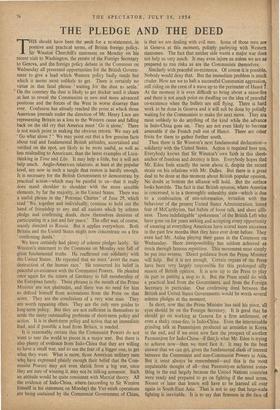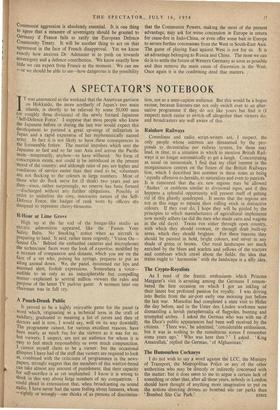THE PLEDGE AND THE DEED
THIS should have been the week for a re-statement, in positive and practical terms, of British foreign policy. Sir Winston Churchill's statement on Monday on his recent visit to Washington, the return of the Foreign Secretary to Geneva, and the foreign policy debate in the Commons on Wednesday all presented opportunities for the British Govern- ment to give a lead which Western policy badly needs but which it seems most unlikely to get. There is certainly no virtue in that fatal phrase ' waiting for the dust to settle.'
2* On the contrary the dust is likely to get thicker until it clears at last to reveal the Comniunists in new and more advanced positions and the forces of the West in worse disarray than ever. Confusion has already reached the point at which those American journals under the direction of Mr. Henry Luce are representing Britain as a loss to the Western cause and falling back on the old cry that America must ' Go it alone.' There is not much point in making the obvious retorts. We may ask ' Go what alone ? ' We may point out that a few genuine facts about real and fundamental British attitudes, ascertained and verified on the spot, are likely to be more useful, as well as less misleading to Americans, than the latest examples of Luce- thinking in Time and Life. It may help a little, but it will not help much. Anglo-American relations, at least at the popular level, are now in such a tangle that reason is hardly enough. It is necessary for the British Government to demonstrate by practical action—which may be painful to us—that it really does stand shoulder to shoulder with the more . sensible elements, by far the majority, in the United States. There was a useful phrase in the ' Potomac Charter' of June 29, which read ' We, together and individually, continue to hold out the hand of friendship to any and all nations which by solemn pledge and confirming deeds, show themselves desirous of participating in a just and fair peace.' The offer was, of course, mainly directed to Russia. But it applies everywhere. Both Britain and the United States might now concentrate on a few ' confirming deeds.'
We have certainly had plenty of solemn pledges lately. Sir Winston's statement to the Commons on Monday was full of great fundamental truths. He reaffirmed our solidarity with the, United States. He repeated that we must ' avert the mass destruction of the human race.' He reasserted his belief in peaceful co-existence with the Communist Powers. He pleaded once again for the return of Germany to full membership of the European family. These phrases in the mouth of the Prime Minister are not platitudes, and there was no need for him to defend himself from accusations from the Press on that score. They are the conclusions of a very wise man. They are worth repeating often. They are the only sure guides to long-term policy. But they are not sufficient in themselves to settle the many outstanding problems of short-term policy and action. It is in short-term policy and action that an immediate lead, and if possible a lead from Britain, is needed.
It is reasonably certain that the Communist Powers do not want to tear the world to pieces in a major war. But there is also plenty of evidence from Indo-China that they are willing to have a small war, and to use the fear of a bigger one, to get what they want. What is more, those American military men whq have expressed plainly enough their belief that the Com- munist Powers may not even shrink from a big war, once they are sure of winning it, may not be talking nonsense. Such an attitude would be quite consistent with Marxist theory. All the evidence of Indo-China, where (according to Sir Winston himself in his statement on Monday) the Viet-minh operations are being sustained by the Communist Government of China, is that we are dealing with evil men. Some of those men are in Geneva at this moment, politely parleying with Western statesmen. The fact that neither side wants a major war does not help us very much. It may even injure us unless we are Ira prepared to run risks as are the Communists themselves.
Similarly with peaceful co-existence. Of course it is possible. Nobody would deny that. But the immediate problem is much cruder. How are we to halt a successful Communist aggression, still riding on the crest of a wave up to the perimeter of Hanoi 7, At the moment it is even difficult to bring about a cease-fire and there is not much point on dwelling on the idea of peaceful co-existence when the bullets are still flying. There is hard work to be done in Geneva and it will not be done by politely waiting for the Communists to make the next move. They are most unlikely to do anything of the kind while the advance in Indo-China goes on. They are not even likely to become amenable if the French pull out of Hanoi. There arc other fruits for them to gather further south.
Then there is Sir Winston's next fundamental declaration-7. solidarity with the United States. Action is required here too. Everybody knows that Sir Winston's own faith in this sheets anchor of freedom and decency is firm. Everybody hopes that Mr. Eden feels exactly the same about it, despite the recent strain on his relations with Mr. Dulles. But there is a great deal to be done at this moment about British popular opinion. No doubt at bottom the alliance will hold. But the surface looks horrible. The fact is that British opinion, where America is concerned, is in a thoroughly unhealthy state—which is due to a combination of mis-information, irritation with the behaviour of the present United States Administration, latent fear of McCarthyism, bad habits of loose talk, and sheer silli- ness. Those indefatigable spokesmen' of the British Left who have gone on for years seeking and accepting every opportunity of sneering at everything American have scored more successes in the past few months than they have ever done before. They even had Mr. Attlee playing their game in the Commons on Wednesday. Sheer irresponsibility has seldom achieved as much through fatuous repetition. This movement must simply be put into reverse. Direct guidance from the Prime Minister will help. But it is not enough. Certain organs of the Press have been very largely responsible for this prolonged silly season of British opinion. It is now up to the Press to play its part in putting a stop to it. But the Press could do with a practical lead from the Government, and from the Foreign Secretary in particular. One confirming deed between the British and United States Governments would be worth several solemn pledges at the moment.
In short, now that the Prime Minister has said his piece, all eyes should be on the Foreign Secretary. It is good that ho should go on working at Geneva for a firm settlement, or even a shaky cease-fire, in Indo-China. Even the interminable grinding talk at Panmunjom produced an armistice in Korea in the end, and if we must now face the prospect of another Panmunjom for Indo-China—if that,is what Mr. Eden is trying to achieve now—then we must face it. It may be the best answer that we can get, given the fundamental clash of interest between the Communist and non-Communist Powers in Asia. But it must always be remembered—and this is the most unpalatable. thought of all—that Panmunjom achieved some- thing in the end largely because the United Nations countries were ready and prepared to go on fighting if the need arose. Sooner or later that lesson will have to be learned all over again in South-East Asia. That is not to say that large-scale fighting is inevitable. It is to say that firmness in the face of
Communist aggression is absolutely essential. It is one thing to agree that a measure of sovereignty should be granted to Germany if France fails to ratify the European Defence Community Treaty. It will be another thing to act on that agreement in the face of French disapproval. Yet we know exactly how anxious Dr. Adenauer is to push on towards sovereignty and a defence contribution. We know exactly how little we can expect from France at the moment. We can see —or we should be able to see—how dangerous is the possibility that the Communist Powers, making the most of the present advantage, may ask for some concession in Europe in return for cease-fire in Indo-China, or even offer some bait in- Europe to secure further concessions from the West in South-East Asia. The game of playing East against West is not for us. It is an advantage belonging to Russia and China. The most we can do is to settle the future of Western Germany as soon as possible and thus remove the main cause of dissension in the West. Once again it is the confirming deed that matters. ,



































 Previous page
Previous page